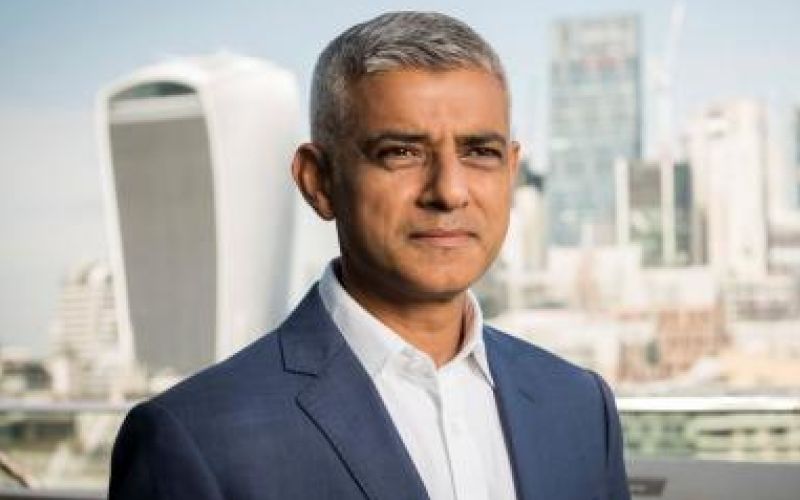The mayor of London has defended his decision to set up a board of nearly 30 senior figures to oversee the recovery from coronavirus in the capital without including any members representing disabled people.
Membership of the London Recovery Board is made up of “elected leaders and senior stakeholders” from local authorities, business, the community and voluntary sector, trade unions, further and higher education, the NHS and the police.
The aim of the board – which is co-chaired by the Labour mayor, Sadiq Khan (pictured), and the Labour chair of London Councils, Cllr Peter John – is to co-ordinate the planning for London’s long-term recovery from the coronavirus crisis.
Part of its job is to support communities that have been “most impacted by the virus” and “narrow social, economic and health inequalities”.
Its members include representatives from the London Resilience Faith Sector Panel, Operation Black Vote, management consultants Planet Communications, and The Royal Society for the Protection of Birds.
But there does not appear to be a single disabled person among its 29 members, and there is no disabled people’s organisation (DPO) represented on the board.
This failure comes despite the disproportionate impact of the pandemic on disabled people.
In June, Inclusion London, the pan-London DPO, published research showing that disabled people had faced the “grim effects” of discrimination and inequality in every area of their lives from the beginning of the pandemic.
The following month, Disability News Service published research which showed that the government had breached the rights of disabled people in at least 17 different ways during the coronavirus crisis.
One prominent disabled campaigner, who asked not to be named, said: “Disabled people who live in, work or visit London should be disappointed in this awful oversight which excludes us from the long-term recovery plans being formulated for this city.
“Time and time again we see that disabled people bear the brunt of any downturn in the economy and disruption to public services.
“To omit the voices of disabled people from the work of the Recovery Board sends yet another signal that disabled people just don’t matter to the GLA [Greater London Authority].”
Although Inclusion London is not a member of the London Recovery Board, it is a member of a sub-group of the board, the London communities strategy group.
Tracey Lazard, chief executive of Inclusion London, said: “Inclusion London welcomes the opportunity to be a member of the London communities strategy group, which has a specific remit to ensure the needs and views of London’s diverse communities are understood and fed into both the work of the [London Transition Board and the London Recovery Board].”
But she said that one channel for community insight and expertise was “simply not enough”.
She said Inclusion London hoped that board members would carry out additional engagement with DPOs and members of the mayor’s equality and diversity advisory group “to ensure the specific needs of Deaf and disabled Londoners, who have been so disproportionately affected by COVID-19, are understood and addressed” in the “vital work” they will be overseeing.
A spokesperson for the mayor of London did not explain why there were no disabled people or DPOs on the board.
But she said the board and the taskforce that supports it were “committed to working with a range of community groups and partners, including disabled Londoners and Deaf and disabled people’s organisations”.
She said: “The board is clear that London’s recovery can only be achieved through partnership, and has engaged with experts and Londoners – especially those who have been hardest hit by the pandemic, such as disabled Londoners – to agree a set of missions which will aid the city’s recovery.”
She said that the mayor’s equality and diversity advisory group – which includes representatives from DPOs – provides “advice and guidance” on the recovery programme.
And she said that “representatives from civil society – identified specifically for their intersectional expertise – have been appointed to the taskforce to lead on equalities issues”.
London Councils declined to comment.
A note from the editor:
Please consider making a voluntary financial contribution to support the work of DNS and allow it to continue producing independent, carefully-researched news stories that focus on the lives and rights of disabled people and their user-led organisations.
Please do not contribute if you cannot afford to do so, and please note that DNS is not a charity. It is run and owned by disabled journalist John Pring and has been from its launch in April 2009.
Thank you for anything you can do to support the work of DNS…

 ‘We will not give a single inch,’ disabled activists vow, as Kendall publishes disability cuts bill
‘We will not give a single inch,’ disabled activists vow, as Kendall publishes disability cuts bill ‘Real danger’ that disabled people will not benefit from £39 billion for social and affordable homes
‘Real danger’ that disabled people will not benefit from £39 billion for social and affordable homes Benefit cap could see countless PIP claimants left homeless after cuts, but DWP has no idea how many
Benefit cap could see countless PIP claimants left homeless after cuts, but DWP has no idea how many